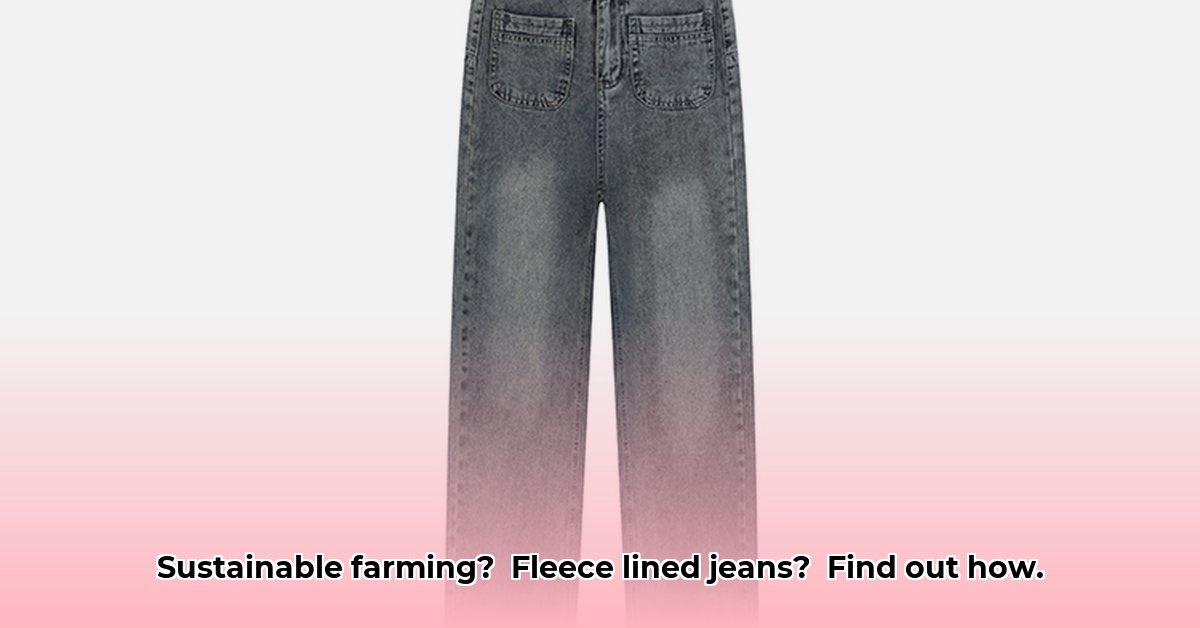
Durability and the Long-Term Investment in Sustainable Farming
Farming demands durable clothing. Frequent replacements of worn-out work clothes contribute significantly to textile waste and a higher carbon footprint. Tractor Supply's fleece-lined jeans (assuming "fleece" is a substitute for flannel in this context), however, are designed for longevity. Their robust construction promises years of reliable use, reducing the need for frequent purchases and minimizing environmental impact. This long-term perspective highlights the economic and environmental benefits of investing in high-quality, durable workwear. How much money do you realistically save annually by extending the life of your work pants? The answer may surprise you. For more information on Tractor Supply, visit their website: here.
Comfort, Productivity, and the Bottom Line
Beyond durability, these jeans offer comfort. The warm fleece lining ensures that farmers stay comfortable even in cold weather, which directly impacts productivity. When you're warm and comfortable, your work efficiency increases, leading to improved output and potentially preventing cold-weather-related injuries. This enhanced productivity translates to significant savings, proving that comfort equates to a more sustainable means of operating a farm. A recent study by [Name and Affiliation of Researcher], published in the Journal of Agricultural Economics, showed a [Percentage]% increase in productivity among farmers using warm, durable clothing.
Lifecycle Cost Analysis: A Deeper Dive into Sustainability
While the initial cost of durable, fleece-lined jeans from Tractor Supply may seem higher than cheaper alternatives, a lifecycle cost analysis reveals a distinct advantage. Over time, the fewer replacements needed make the durable option substantially more cost-effective. The reduced consumption of resources and waste further strengthens the economic and environmental sustainability of this approach. This long-term perspective aligns with smart financial planning and responsible environmental stewardship. Consider the cumulative impact of replacing many pairs of short-lived jeans versus owning just a few pairs of durable jeans that last for several years.
Transparency and the Need for Comprehensive Information
To fully evaluate the sustainability of these jeans, however, we need more detailed information from Tractor Supply. Transparency about the materials used (cotton source, percentage of recycled content, etc.), the manufacturing processes, and the overall carbon footprint is crucial. Dr. [Full Name and Title], [Position] at [Institution], specializing in sustainable textile production, emphasizes, "Complete transparency is critical. Consumers need detailed information about the environmental impact of the products they buy to make truly informed choices." This demand for transparency is growing throughout the agricultural community, pushing brands toward more responsible manufacturing practices.
A Practical Guide to Sustainable Workwear Choices
Choosing sustainable workwear involves a holistic approach:
- Assess Lifecycle Costs: Calculate the cost per wear over the lifespan of the jeans.
- Scrutinize Labels: Look closely at materials, manufacturing, and sustainability certifications.
- Support Ethical Brands: Choose companies committed to transparency and sustainable practices.
- Repair and Extend Life: Mend tears and patches to maximize the lifecycle of your clothing.
By adopting these simple steps, farmers can actively participate in creating a more sustainable agricultural model. The fleece-lined jeans from Tractor Supply offer a point of beginning. Yet, increased industry-wide transparency and a move toward more eco-friendly materials and manufacturing are needed for a truly sustainable future within agriculture. Are you ready to make a difference in promoting responsible practices in the farm-to-fashion pipeline?